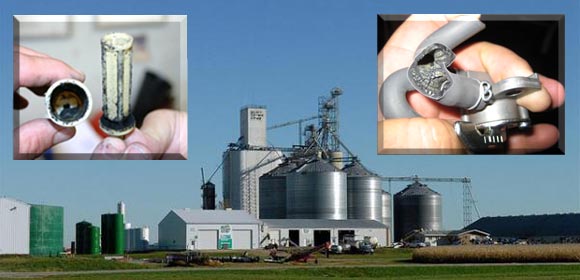The ‘Unintended Effects’ of Government-Mandated Ethanol

Ethanol is a strong solvent and cleanser, and while small amounts will keep your engine clean, excess alcohol will wear down engine parts and make the engine run hotter. Ethanol in gasoline degrades fuel lines, membranes in fuel pumps, and has generally been recognized by automotive experts to damage vehicles’ fuel systems. Now, the recent release of a United Nations report on corn ethanol has triggered new discussions on the benefits and drawbacks of the biofuel.
The report by the U.N.’s Intergovernmental Panel on Climate Change stated that while biofuels do release smaller amounts of greenhouse gases than gasoline or diesel, “for some biofuels indirect emissions — including from land use change — can lead to greater total emissions than when using petroleum products.” Moreover, the negative consequences of including corn ethanol in the fuel supply are enormous.
In 2000, more than 90 percent of the corn grown in the United States went to feed people and livestock, including many people in undeveloped countries, and less than 5 percent was used to produce ethanol.
The Energy Policy Act of 2005 dictated that gasoline contain a minimum volume of renewable fuels. By 2013, 40 percent of the corn crop went to produce ethanol, 45 percent fed livestock, and just 15 percent was used for foods and beverages, according to a report from Forbes.
On average, one bushel of corn can produce nearly three gallons of ethanol. This year the United States — which produces 40 percent of the world’s corn and accounts for 70 percent of worldwide corn imports — will use nearly 5 billion bushels to produce more than 13 billion gallons of ethanol fuel. The corn needed to fill a 25-gallon gas tank with ethanol could feed one person for a year, “so the amount of corn used to make that 13 million gallons will not feed the almost 500 million people it was feeding in 2000. This is the entire population of the Western Hemisphere outside the United States,” observed Forbes contributor James Conca.
In 2007, the global price of corn doubled due to the increase in ethanol production, leading to increases in the price of milk, cheese, eggs, meat, cereals, and corn-based sweeteners, and world grain reserves dwindled to their lowest level in over 30 years. Increased corn prices can also impact a surprising array of other products, including toothpaste, cosmetics, shampoo, and adhesives. “Additional unintended effects from the increase in ethanol production include the dramatic rise in land rents,” as well as an increase in the natural gas and chemicals used for fertilizers, over-pumping of aquifers, and clear-cutting of forests to plant corn crops, Forbes reported.
As for the rationale to counter all these negative effects, the International Institute for Sustainable Development has estimated that the CO2 and climate benefits from replacing petroleum fuels with biofuels like ethanol are “basically zero.”
Now thanks to our government we have to suffer the consequences in the maintenance cost of our classic Citroëns. One way to minimize ethanol damage is to buy ethanol free gas from one of the few sources still available. Shell premium gas and Sunoco 94 are ethanol free.
Ethanol Gasoline – General Problems/Issues:
1. Water Absorption!
Water Contamination (W/C) and Phase Separation (P/S) of gasoline;
Ethanol attracts, absorbs and holds moisture in fuel tank with increased occurrence of lean, water-diluted fuel.
2. Vapor lock or fuel starvation- Most common in carbureted engines, hot weather and/or at high altitude. (Ethanol increases gasoline’s vapor pressure).
3. Drop in octane (after water absorption, P/S and W/C occurs).
4. Decreased fuel efficiency and mpg due to lower energy. [E10 Reformulated Gasoline = 111,836 BTU/gallon. Non-ethanol Gasoline = 114,000 BTU/Gallon. (Diesel and Kerosene Jet Fuel have about 129,000 BTU/gal).]
5. Decreased life cycle of parts and engine.
6. Decreased shelf life of gasoline.
Engine/Parts Damage:
1. Wear and damage of internal engine parts.
2. Damage to metal, rubber, and plastic parts of fuel system.
3. Corrosion of metal parts in fuel system and engine.
4. Deterioration of elastomers and plastic parts.
5. Deterioration of non-metallic materials.
6. Fuel permeation through flexible fuel lines.
7. Drying, softening, stretching and/or cracking of rubber hoses,
seals and other rubber components.
8. Oxygen sensor damage.
9. Damage or premature disintegration of fuel pump.
10. Carburetor damage, including clogging.
11. Dirty and clogged fuel filters.
12. Clogging and plugging of fuel injectors.
13. Destruction of certain fiberglass fuel tanks.
14. Removal or fading of paint and varnish (both internal and external parts of engine).
15. Piston/bore failure through knock/pre-ignition.
16. Piston ring sticking.
17. Unsuitable ignition timing resulting in ignition failure.
18. Gumming-up of fuel injectors, carburetors, etc. due to release of accumulated deposits in engine from ethanol alcohol’s solvent properties.

As of 2023 here in Canada our “we know better” Government has succeeded in eliminating our ability to purchase ethanol-free gasoline. It used to be that selecting Shell 91 octane (or 93 if you could find it) ensured that ethanol was not going to degrade the rubber fuel lines, pump membrane or contribute to corrosion in your carburetor and gas tank. (We have written a few times about the hazards of ethanol — search “ethanol” on Citroënvie). Although you will now have to deal with the additional maintenance issues that will inevitably result from using ethanol additive gas, we hope it does not deter you from getting out on the road to experience the refreshing difference of driving a classic Citroën.